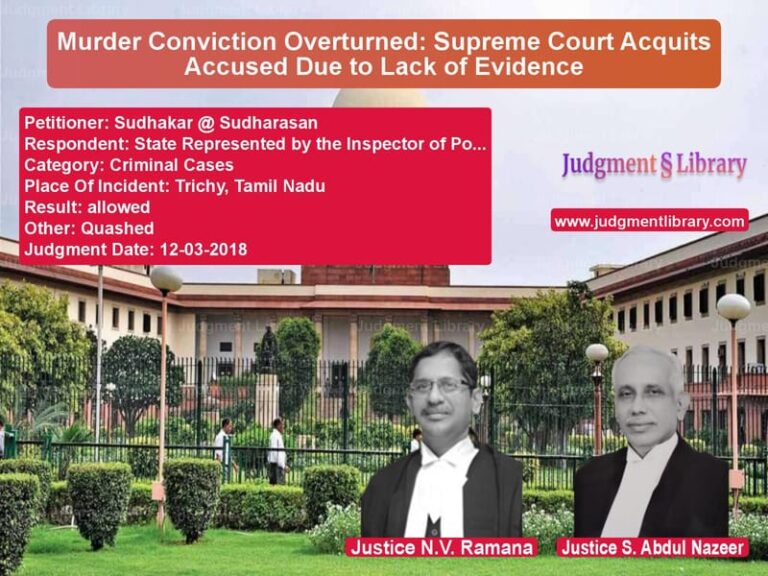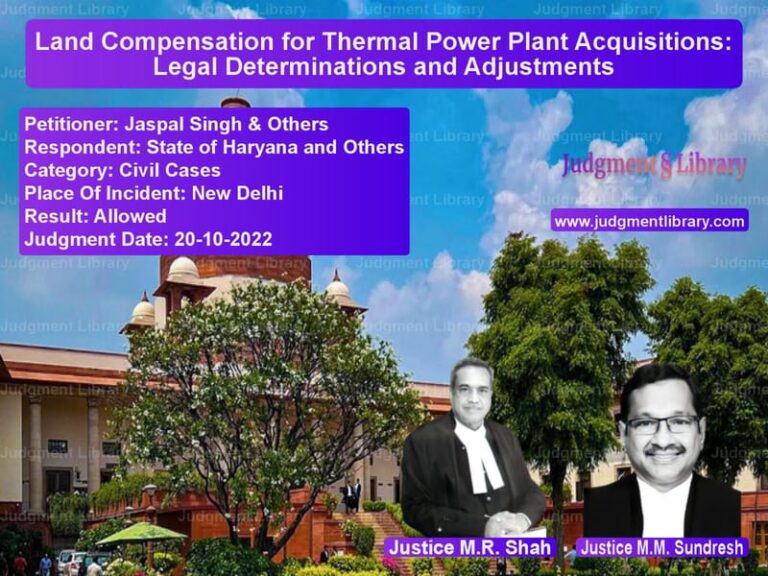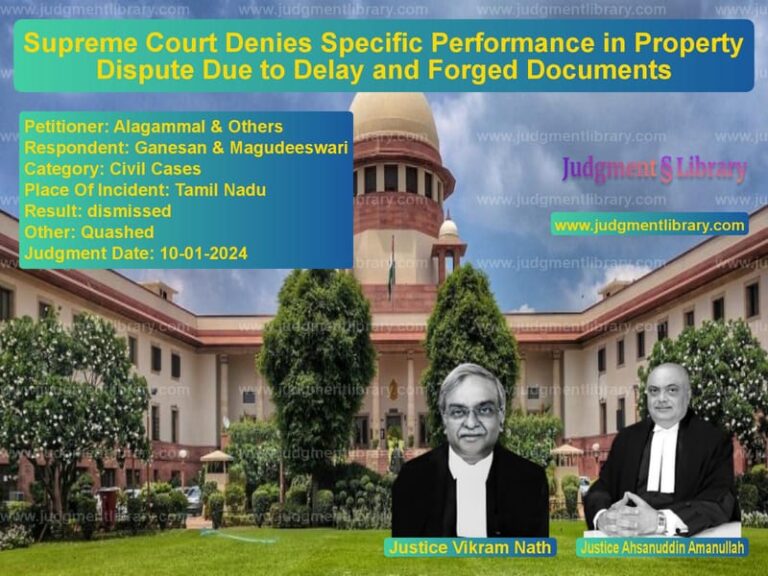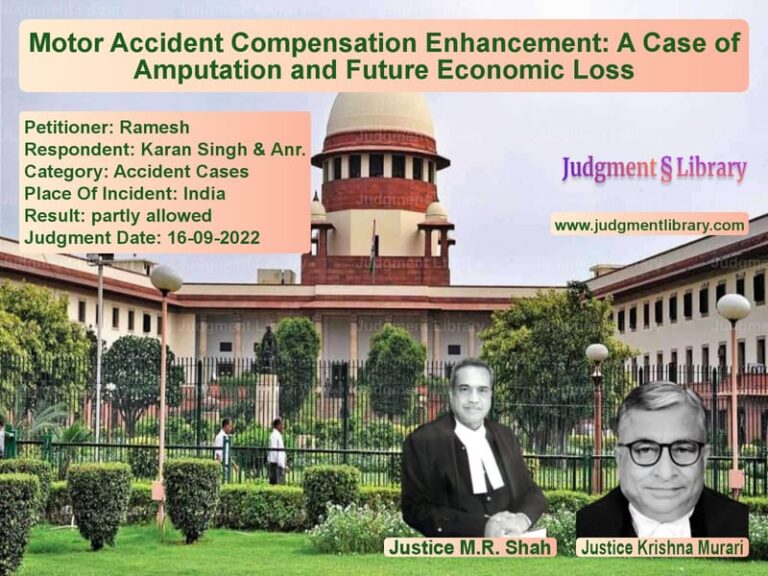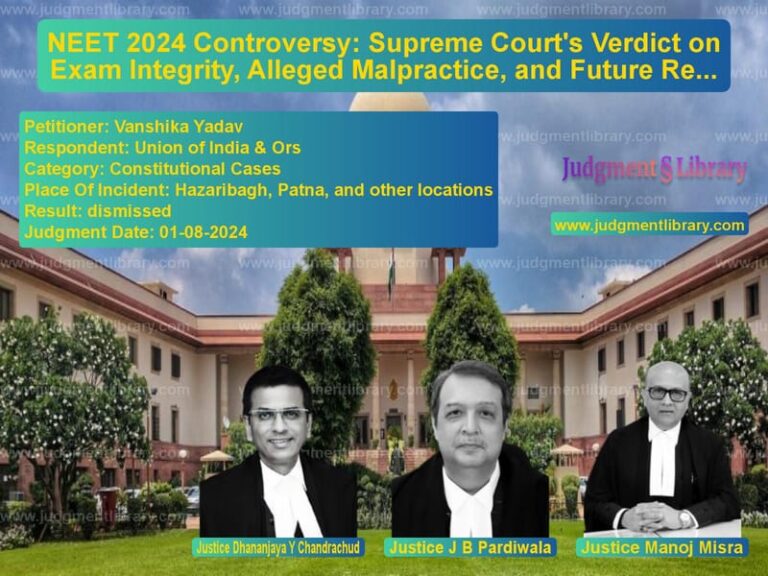Supreme Court Overturns Delhi High Court Order in Murder Conviction Appeal
The Supreme Court of India recently ruled in the case of Lakhan Singh vs. Amarjeet Singh & Anr., addressing the admissibility of additional evidence in a murder conviction appeal. The case revolved around the plea of insanity raised by the appellant, who was convicted for murder under Section 302 of the Indian Penal Code (IPC). The Court set aside the Delhi High Court’s order that had allowed additional evidence regarding the accused’s mental condition, ruling that such evidence had already been considered in previous proceedings.
The ruling is a crucial precedent for criminal appeals, clarifying the scope of additional evidence under Sections 311 and 391 of the Code of Criminal Procedure (CrPC) and reaffirming that insanity pleas must be scrutinized rigorously.
Background of the Case
The case arose from a murder conviction where the accused, Amarjeet Singh, sought to introduce fresh evidence at the appellate stage, claiming insanity at the time of the crime.
The key timeline of events was as follows:
- 2011: FIR No. 211/2011 was registered against Amarjeet Singh for murder.
- 2014: The trial court rejected his plea of unsound mind and proceeded with the trial.
- December 15, 2018: The Additional Sessions Judge convicted him under Section 302 IPC and sentenced him to life imprisonment with a fine of Rs. 1 lakh.
- 2019: Amarjeet Singh filed an appeal before the Delhi High Court.
- 2020: He sought to introduce fresh medical records claiming he was of unsound mind at the time of the crime.
- March 29, 2022: The Delhi High Court allowed his application and remanded the case to the trial court for recording additional evidence.
- December 6, 2022: The Supreme Court overturned the High Court’s order, restoring the appeal for fresh consideration.
Arguments by the Appellant (Lakhan Singh – Complainant)
The complainant’s counsel argued:
- The trial court had already examined medical evidence and determined that the accused was fit to stand trial.
- The Delhi High Court ignored the fact that the Supreme Court had previously upheld the trial court’s findings on the accused’s mental condition.
- The plea of unsound mind was being misused to delay proceedings.
Arguments by the Respondents (Amarjeet Singh – Accused)
The defense countered:
- The accused was mentally unfit at the time of the crime, and this crucial fact was overlooked during trial.
- Medical records from IHBAS, Dilshad Garden suggested that he had been receiving psychiatric treatment before the incident.
- Sections 311 and 391 CrPC allow for additional evidence if it serves the interests of justice.
Supreme Court’s Judgment
The Supreme Court ruled in favor of the appellant and overturned the Delhi High Court’s order, holding:
- The accused’s mental condition had already been examined during the trial, and there was no justification for further evidence.
- The High Court failed to consider previous rulings that had established the accused as fit to face trial.
- “The proposition of taking additional evidence in a criminal appeal cannot be adopted as a matter of course by the Appellate Court.”
- If additional evidence was required, the High Court should have recorded it itself instead of remanding the case.
Key Precedents Cited
The Supreme Court relied on multiple landmark cases, including:
- Ranjitsing Brahmajeetsing Sharma vs. State of Maharashtra (2005): Defined the scope of additional evidence in criminal appeals.
- Zahira Habibullah Sheikh vs. State of Gujarat (2004): Stated that additional evidence must be necessary and not merely convenient.
- State of Haryana vs. Bhajan Lal (1992): Established guidelines for quashing improper judicial orders.
Impact of the Judgment
This Supreme Court ruling has several major implications:
- Prevents misuse of additional evidence: Ensures that evidence is not introduced to delay trials.
- Clarifies procedural law: Confirms that appellate courts must record additional evidence themselves if required.
- Strengthens trial court findings: Reinforces that mental fitness assessments made during trial should not be revisited without strong justification.
Conclusion
The Supreme Court’s ruling in Lakhan Singh vs. Amarjeet Singh & Anr. upholds the integrity of criminal trials by preventing unnecessary remand orders. The judgment ensures that pleas of insanity are evaluated rigorously and that additional evidence is introduced only when legally necessary.
The verdict sets an important precedent for future criminal appeals, emphasizing judicial efficiency and fairness in trial procedures.
Petitioner Name: Lakhan Singh.Respondent Name: Amarjeet Singh & Anr..Judgment By: Justice Dinesh Maheshwari, Justice Sudhanshu Dhulia.Place Of Incident: Delhi.Judgment Date: 06-12-2022.
Don’t miss out on the full details! Download the complete judgment in PDF format below and gain valuable insights instantly!
Download Judgment: lakhan-singh-vs-amarjeet-singh-&-anr-supreme-court-of-india-judgment-dated-06-12-2022.pdf
Directly Download Judgment: Directly download this Judgment
See all petitions in Murder Cases
See all petitions in Bail and Anticipatory Bail
See all petitions in Judgment by Dinesh Maheshwari
See all petitions in Judgment by Sudhanshu Dhulia
See all petitions in allowed
See all petitions in Remanded
See all petitions in supreme court of India judgments December 2022
See all petitions in 2022 judgments
See all posts in Criminal Cases Category
See all allowed petitions in Criminal Cases Category
See all Dismissed petitions in Criminal Cases Category
See all partially allowed petitions in Criminal Cases Category


